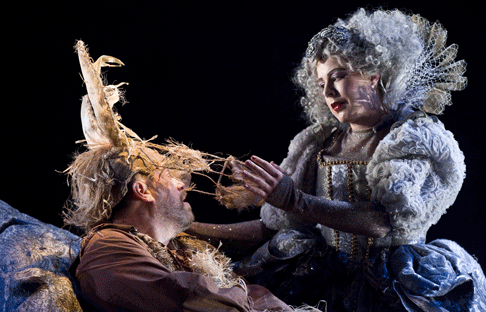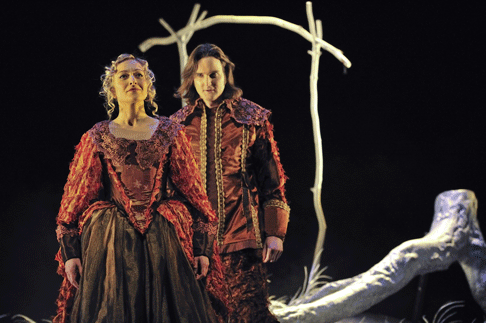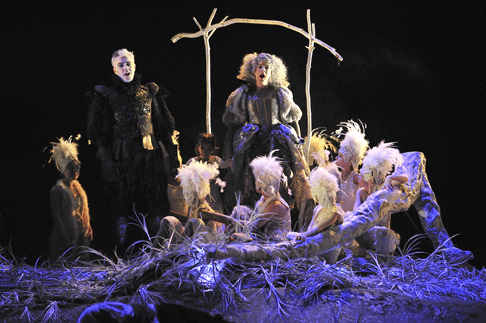![Jonathan Peter Kenny as Oberon and David Gooderson as Puck [Photo by Richard Hubert Smith courtesy of the English Touring Opera]](http://www.operatoday.com/Jonathan-Peter-Kenny-and-Da.gif)
15 Mar 2010
A Midsummer Night’s Dream by ETO
A silvery tree stretched its gnarled branches across the moonlit stage, and from the briar and bush spiky, feathered fairies wriggled and crept, intent on mischief and malevolence.
English Touring Opera are delighted to announce a season of lyric monodramas to tour nationally from October to December. The season features music for solo singer and piano by Argento, Britten, Tippett and Shostakovich with a bold and inventive approach to making opera during social distancing.
This tenth of ten Live from London concerts was in fact a recorded live performance from California. It was no less enjoyable for that, and it was also uplifting to learn that this wasn’t in fact the ‘last’ LfL event that we will be able to enjoy, courtesy of VOCES8 and their fellow vocal ensembles (more below …).
Ever since Wigmore Hall announced their superb series of autumn concerts, all streamed live and available free of charge, I’d been looking forward to this song recital by Ian Bostridge and Imogen Cooper.
The Sixteen continues its exploration of Henry Purcell’s Welcome Songs for Charles II. As with Robert King’s pioneering Purcell series begun over thirty years ago for Hyperion, Harry Christophers is recording two Welcome Songs per disc.
Although Stile Antico’s programme article for their Live from London recital introduced their selection from the many treasures of the English Renaissance in the context of the theological debates and upheavals of the Tudor and Elizabethan years, their performance was more evocative of private chamber music than of public liturgy.
In February this year, Albanian soprano Ermonela Jaho made a highly lauded debut recital at Wigmore Hall - a concert which both celebrated Opera Rara’s 50th anniversary and honoured the career of the Italian soprano Rosina Storchio (1872-1945), the star of verismo who created the title roles in Leoncavallo’s La bohème and Zazà, Mascagni’s Lodoletta and Puccini’s Madama Butterfly.
Evidently, face masks don’t stifle appreciative “Bravo!”s. And, reducing audience numbers doesn’t lower the volume of such acclamations. For, the audience at Wigmore Hall gave soprano Elizabeth Llewellyn and pianist Simon Lepper a greatly deserved warm reception and hearty response following this lunchtime recital of late-Romantic song.
Collapsology. Or, perhaps we should use the French word ‘Collapsologie’ because this is a transdisciplinary idea pretty much advocated by a series of French theorists - and apparently, mostly French theorists. It in essence focuses on the imminent collapse of modern society and all its layers - a series of escalating crises on a global scale: environmental, economic, geopolitical, governmental; the list is extensive.
For this week’s Live from London vocal recital we moved from the home of VOCES8, St Anne and St Agnes in the City of London, to Kings Place, where The Sixteen - who have been associate artists at the venue for some time - presented a programme of music and words bound together by the theme of ‘reflection’.
'Such is your divine Disposation that both you excellently understand, and royally entertaine the Exercise of Musicke.’
Amongst an avalanche of new Mahler recordings appearing at the moment (Das Lied von der Erde seems to be the most favoured, with three) this 1991 Mahler Second from the 2nd Kassel MahlerFest is one of the more interesting releases.
‘And there was war in heaven: Michael and his angels fought against the dragon; and the dragon fought and his angels, And prevailed not; neither was their place found any more in heaven … that old serpent … Satan, which deceiveth the whole world: he was cast out into the earth, and his angels were cast out with him.’
If there is one myth, it seems believed by some people today, that probably needs shattering it is that post-war recordings or performances of Wagner operas were always of exceptional quality. This 1949 Hamburg Tristan und Isolde is one of those recordings - though quite who is to blame for its many problems takes quite some unearthing.
There was never any doubt that the fifth of the twelve Met Stars Live in Concert broadcasts was going to be a palpably intense and vivid event, as well as a musically stunning and theatrically enervating experience.
‘Love’ was the theme for this Live from London performance by Apollo5. Given the complexity and diversity of that human emotion, and Apollo5’s reputation for versatility and diverse repertoire, ranging from Renaissance choral music to jazz, from contemporary classical works to popular song, it was no surprise that their programme spanned 500 years and several musical styles.
The Academy of St Martin in the Fields have titled their autumn series of eight concerts - which are taking place at 5pm and 7.30pm on two Saturdays each month at their home venue in Trafalgar Square, and being filmed for streaming the following Thursday - ‘re:connect’.
The London Symphony Orchestra opened their Autumn 2020 season with a homage to Oliver Knussen, who died at the age of 66 in July 2018. The programme traced a national musical lineage through the twentieth century, from Britten to Knussen, on to Mark-Anthony Turnage, and entwining the LSO and Rattle too.
With the Live from London digital vocal festival entering the second half of the series, the festival’s host, VOCES8, returned to their home at St Annes and St Agnes in the City of London to present a sequence of ‘Choral Dances’ - vocal music inspired by dance, embracing diverse genres from the Renaissance madrigal to swing jazz.
Just a few unison string wriggles from the opening of Mozart’s overture to Le nozze di Figaro are enough to make any opera-lover perch on the edge of their seat, in excited anticipation of the drama in music to come, so there could be no other curtain-raiser for this Gala Concert at the Royal Opera House, the latest instalment from ‘their House’ to ‘our houses’.
"Before the ending of the day, creator of all things, we pray that, with your accustomed mercy, you may watch over us."
![Jonathan Peter Kenny as Oberon and David Gooderson as Puck [Photo by Richard Hubert Smith courtesy of the English Touring Opera]](http://www.operatoday.com/Jonathan-Peter-Kenny-and-Da.gif)
A silvery tree stretched its gnarled branches across the moonlit stage, and from the briar and bush spiky, feathered fairies wriggled and crept, intent on mischief and malevolence.
Joanna Parker’s simple single-set design for this revival of James Conway’s thoughtful production was in some ways the star of the show. Bathed in ultramarine gleams, the twisted tendrils tripped and tangled the confused lovers; there would be no sweet dreams in this enchanted wood, just nocturnal nightmares and strange imaginings.
From the haunted shadows emerged Jonathan Peter Kenny’s Oberon, a haughty warlord, clad in black, strutting proudly and contemptuously through his midnight kingdom. Kenny’s timbre was sweet and eerie, but the perennial problem of balance in the duets between the fairy monarchs was not overcome, and Oberon – lacking power and clarity of diction – was somewhat overshadowed by his tempestuous Tytania. As the Fairy Queen, Gillian Ramm’s bright voice shone, matching the shimmers of her silvery gown. The brilliance of her upper range pierced like a moon beam through the night sky, and it was no wonder that that beauty of her chain of falling thirds, ‘I how I love thee’, won the ass-headed Bottom’s heart.
The four lovers all gave solid individual performances, but there was little dramatic distinction between them – perhaps this is an inherent weakness of the score, for the lovers often share the same predominant melodic material, rising and falling scales. Most impressive was Robert Davies as Demetrius; he used both the words and vocal colour effectively to establish character. Niamh Kelly (Hermia) and Laura Mitchell (Helena) were tidily matched, and Michael Bracegirdle conveyed the yearning and urgency of Lysander’s passion.
The final act often lacks the intensity of the night-time meanderings of Acts 1 and 2, so it was pleasing here to see coherence maintained. For once, the rude mechanicals’ amateur dramatics did not feel like a redundant add-on, a gratuitous send-up originating from Peter Pears’ drag impersonation of Joan Sutherland. The pace was well-sustained, physical movements deftly choreographed, and the lunacy of the proceedings kept just the right side of farce. Andrew Slater, as Bottom, sang warmly and surely throughout, while Mark Wilde (Flute) demonstrated confident comic timing and a sharp awareness of the impact of small gestures, musical and dramatic. Mayhem was balanced by majesty, Nicholas Lester’s Theseus and Lise Christensen’s Hippolyta injecting some solemnity into the proceedings. Similarly, the arrangement of the lovers at the foot of the performing platform, and their involvement in the concluding dance, lent an air of harmony and unity to the scene.
The fairies were less successful. Owing to the exigencies of touring, four young female sopranos were joined by a countertenor, and supplemented by eight local boys and girls. A little uncertain and hesitant, this mixed voice medley could not recreate the uncanny, ethereal timbre of a band of goblin brothers. In contrast, David Gooderson’s Puck was assured, his spoken text expertly and chillingly delivered. Just one query: why did he spend the evening with his arms taped to his side?
 Andrew Slater as Bottom and Gillian Ramm as Tytania
Andrew Slater as Bottom and Gillian Ramm as Tytania
In this opera, so much depends on the orchestral fabric, and it was evident from the opening glissandi sweeps, that the instrumentalists, under the skilful baton of Michael Rosewell would expertly lull us into the world of dreams, shimmering and enticing us with colours of enchantment.
 Lise Christensen as Hippolyta and Nicholas Lester as Theseus
Lise Christensen as Hippolyta and Nicholas Lester as Theseus
At the final curtain, true love and clear sight were thankfully restored. Slipping his arms free from the ropes that bound him, Puck assured us that all was now mended: “Give me your hands if we be friends, And Robin shall restore amends.” The captivated audience was glad to oblige.
Claire Seymour
 Jonathan Peter Kenny as Oberon and Gillian Ramm as Tytania
Jonathan Peter Kenny as Oberon and Gillian Ramm as Tytania